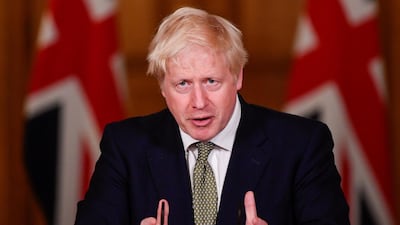UK Prime Minister Boris Johnson on Friday accused the European Union of scuppering plans for a post-Brexit trade deal, but kept the door ajar for a last-minute deal.
Mr Johnson said the EU had tried to strike a deal that was “completely unacceptable” and that the UK would press ahead with planning for a no-deal Brexit.
The British leader last month proposed that both sides should walk away from the talks and prepare for life apart if there was no agreement before an EU leaders’ summit on October 15. He had been seeking a trading deal similar to the one secured by Canada, with few tariffs on goods but doing little for the trade in services.
“For whatever reason, it’s clear from the summit that after 45 years of membership they are not willing – unless there’s some fundamental change of approach – to offer this country the same terms as Canada,” the prime minister said.
Britain has already left the European Union but a transitional deal takes the two sides up until January 1 to agree a new deal on trade and political relations. Failure to do so will see more than four decades of trade regulations and arrangements torn up at a stroke.
Employers’ groups have warned of a huge economic shock if there is a sudden break from the country’s largest trading partner while hauliers have raised concerns of chaos at the borders.
Mr Johnson was responding on Friday to EU leaders who said they were willing to continue trade talks but called on Britain to make the next move.
Future fishing rights and state aid remain among the most difficult issues to be resolved.
French president Emmanuel Macron said he was prepared for a no-deal outcome unless he could get good terms for the powerful fishing lobby in France.
Mr Johnson was elected by a landslide in December 2019 on a promise to make Brexit happen.
One of his former cabinet colleagues claimed that a subsequent trade deal would be “one of the easiest in human history” but the talks have been punctuated by bad-tempered exchanges between the two sides.
Attempts to secure a trade deal have come down to the wire following years of internal wrangling, after the 2016 referendum in which 52 per cent of Britons voted to leave the EU.
There has been scepticism in Brussels that Downing Street would be prepared to pull the plug on the negotiations.
Dutch Prime Minister Mark Rutte said: “Britain has already imposed so many deadlines that came and went.”
European Council president Charles Michel said on Thursday that the EU was “determined” to reach an agreement and told reporters that the EU would decide in the coming days whether trade talks should continue.
“We are united and we will make an assessment in the next days, we will see if it is possible to complete a negotiation,” said Mr Michel.
German Chancellor Angela Merkel, the veteran diplomat, sought to soothe tempers. She said: “We asked Britain to be willing to compromise. This, of course, means that we too have to make compromises."
Britain says it is disappointed with the EU’s approach to the talks and has publicly questioned whether the bloc’s leaders really want to negotiate in good faith.
Foreign Secretary Dominic Raab said the UK is “disappointed and surprised” that the EU had watered down its commitment to intensify the trade talks.
“We have been told that it must be the UK that makes all of the compromises in the days ahead,” Mr Raab told Sky News on Friday. “That can’t be right in a negotiation so we are surprised by that.”


